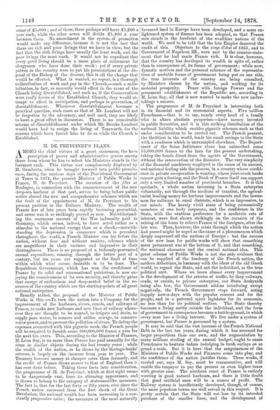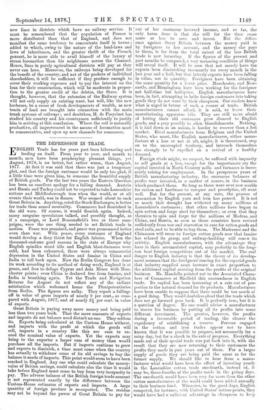M. DE FREYCINET'S PLANS.
AMONG the chief virtues of a great statesman, the keen perception of power and administrative genius among those from whom he has to select his Ministers stands in the foremost rank. This virtue was conspicuously displayed by M. Gambetta when he brought forward into public promin- ence, during Le anxious days of the Provisional Government at Tours in 1871, the present Minister of Public Works in France, M. de Freycinet. The occasion of the fetes at Boulogne, in connection with the commencement of the new deep-sea harbour at that port, serves to bring before public notice abroad the new and comprehensive schemes which are the fruit of the appointment of M. de Freycinet to his present position in the Dufaure Ministry. The wealth of France has of late years been rapidly becoming proverbial, and never was it so strikingly proved as now. Notwithstand- ing the enormous amount of the War indemnity paid to Germany, which seems, indeed, to have acted rather as a stimulus to the national energy than as a check,—notwith- standing the depression in commerce which is prevalent throughout the world, a French Minister can lay before the nation, without fear and without anxiety, schemes which are magnificent in their vastness and impressive in their thoroughness. There is no proposal of a tediously-protracted annual expenditure, running through the better part of a century, but ten years are suggested as the limit of time within which what seems desirable is to be done. The Republican Government, which has won the confidence of France by its solid and unsensational patriotism, is now en- joying the consciousness of its own security, and thereby gains that energy of enthusiasm and deep-seated belief in the re- sources of the country which are the starting-points of all great national enterprises. Broadly stated, the proposal of the Minister of Public Works is this :—To turn the nation into a Company for the improvement of the harbours, rivers, canals, and railways of France, to make new harbours and new lines of railway where- ever they are thought to be wanted, to irrigate and drain, to supply pure water, to remove and utilise sewage, to conserve water-power, and to prevent the pollution of rivers. To defray the expenses connected with this gigantic work, the French people will be required to furnish some 500,000,000 francs a year for the next ten years. This, according to the Minister of Finance, M. L4on Say, is no more than France has paid annually for the same or similar objects during the last twenty years ; while the wealth of the nation, as he shows by the Savings-banks' returns, is largely on the increase from year to year. The Treasury borrows money at cheaper rates than formerly, and the credit of France draws nearer to that of England than it has ever done before. Taking these facts into consideration, the programme of M. de Freycinet, which at first sight seems to be dangerously vast, loses its alarming appearance, and is shown to belong to the category of statesmanlike measures. The fact is, that for the last forty or fifty years, ever since the French nation recovered from the first shock of the Great Revolution, the national wealth has been increasing in a con- stantly progressive ratio ; the resources of the most naturally favoured land in Europe have been developed, and a more en- lightened system of finance has been adopted, so that France now stands in the forefront of the wealthier nations of the world. We used to be told that the late Empire deserved the credit of this. Objectors to the coup d'Itat of 1851, and to Government of Napoleon ifi., were met by the counter-state- ment that he had made France rich. It is clear, however, that the country has developed its wealth in spite of, rather than in consequence of, its forms of government ; while now, dynastic motives and the personal schemes of the representa- tives of unstable forms of government being put on one side, the true interests of the country are being consulted, by Ministers chosen by the nation, and working for its material prosperity. Peace with foreign Powers and the permanent establishment of the Republic are, according to M. Leon Say, all that is now wanted to make the new under- takings a success.
The programme of M. de Freycinet is interesting both in its financial and its economical aspects. Five million Frenchmen—that is to say, nearly every head of a family who is above absolute pauperism—have money invested in public Securities, and it is this striking distribution of the national liability which enables gigantic schemes such as that under consideration to be carried out. The French peasant, the thriftiest in the world, lends his small savings to the State with a readiness which is unexampled elsewhere. The Depart- ment of the Seine Inferieure alone has subscribed some 15,000,000 francs to the loan for the present undertaking, taking the bonds direct from the agents of the Government, without the intervention of the financier. The very simplicity of the financial machinery employed is the cause of its success, and national feeling aids the process, in a country where confid- ence in private co-operation is wanting, where joint-stock banks cannot gain a footing, and the Bank of France itself can support only a very limited number of provincial branches. It is this spectacle, a whole nation investing in a State enterprise voluntarily, not through the medium of taxation, the agricul- turist lending money for harbour improvements and the towns- men for railways in rural districts, which is so impressive, to our minds. The keenly vivid sense of being economically members of one body corporate, and the confidence in the State, with the cautious preference for a moderate rate of interest, were first shown strikingly on the occasion of the raising of the loans to relieve France of the foreigner, after the late war. Then, however, the crisis through which the nation had passed might be urged as the cause of a phenomenon which deeply impressed all the nations of Europe ; but the success of the new loan for public works will show that something more permanent was at the bottom of it and that something, the national character and the central national idea. This great scheme of Public Works is not the only evidence that can be supplied of the tendency of the French nation the modern Athenians, in harmony with the ideas of the old nation, world, to regard the State, and not the individual, as the true political unit. Where we leave almost every improvement in the development of the arteries of traffic, be they railways, roads, or canals, to private enterprise, our State dockyards being also few, the Government seldom interfering except negatively, the French Government steps forward, acting happily now-a-days with the popular consent and for the people, and in a paternal spirit legislates for its economic, no less than for its political welfare. The State thereby becomes a living entity outside the individual, and the form of government in consequence becomes a battle-ground, in which every man has a living interest. We live under a system of government, but France is governed by a system.
It may be said that the vast increase of the French National Debt in the last ten years, during which it has assumed far larger proportions than our own, and the augmentation by many millions sterling of the annual budget, ought to cause Frenchmen to hesitate before indulging in fresh outlays on so grand a scale. But it is here that the sanguineness of the Ministers of Public Works and Finances come into play, and the confidence of the nation justifies them. These works, if carried out, says M. Say, must be remunerative, and will enable the taxpayer to pay the present or even higher taxes with greater ease. The northern coast of France is entirely wanting in good natural harbours, and there is little doubt that good artificial ones will be a source of profit. The Railway system is insufficiently developed, though, of course, the more populous towns are well served in this respect. It is pretty certain that the State will not lose by its intended purchase of the smaller lines, and the development of new lines in districts which have no railway service. It must be remembered that the population of France is more distributed than that of England, and does not manifest the same tendency to concentrate itself in towns ; added to which, owing to the nature of the land-laws and laws of inheritance, and the greater thrift of the French peasant, he is more able to avail himself of the luxury of steam locomotion than his neighbours across the Channel. Hence, lines in purely agricultural districts will pay as they never can here. Moreover, the railways being developed for the benefit of the country, and not of the pockets of individual shareholders, it will be sufficient if they produce enough to cover their working expenses and to pay the interest on the loan for their construction, which will be moderate in propor- tion to the greater credit of the debtor, the State. It is thought, however, that the extension of the Railway system will not only supply an existing want, but will, like the new harbours, be a cause of fresh developments of wealth, as new tracts of land are brought into connection with the main trunk systems of railways ; and doubtless, M. de Freycinet has studied his country and his countrymen sufficiently to justify him in arriving at this conclusion. Where the soil is naturally productive, all improvement in the means of locomotion must be remunerative, and open up new channels for commerce.































 Previous page
Previous page